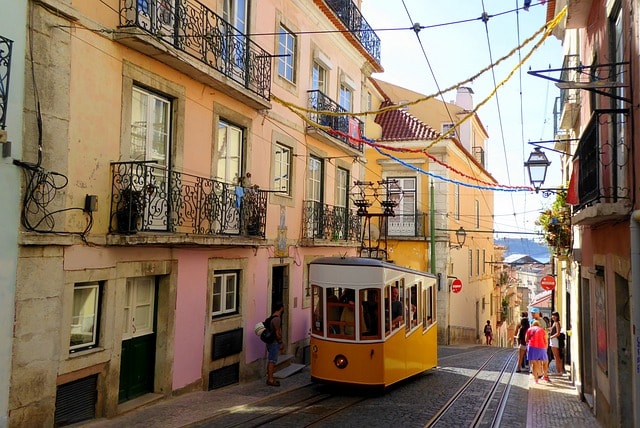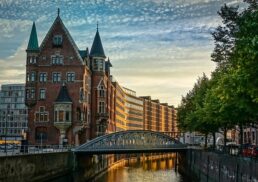Lisboa, called Lisbon in English, is Portugal’s sprawling capital, full of history and culture. This article provides tips on exploring its renowned neighborhoods, historical landmarks, and local cuisine in Lisboa and Lisbon to help you plan an unforgettable trip.
Table of Contents
Key Takeaways
Lisbon, known locally as Lisboa, is a city rich in history and culture, influenced by its origins as a Phoenician trading post and its role during the Age of Discoveries.
The city’s diverse neighborhoods, such as Baixa Pombalina, Bairro Alto, and Príncipe Real, offer unique experiences, from historical exploration to vibrant nightlife.
Lisbon boasts a vibrant culinary scene featuring traditional dishes, local markets, and a dynamic wine culture, making it a destination for food and wine enthusiasts.
Understanding Lisboa and Lisbon

Lisbon, known locally as Lisboa, is Portugal’s largest city and a significant historical and cultural center. Situated on the westernmost capital city edge of the Iberian Peninsula, it overlooks the River Tagus.
Lisbon, the Portuguese capital, is a city of contrasts with ancient ruins juxtaposed against modern architecture. This guide explores its rich history and cultural significance, shedding light on why it has captivated visitors for centuries.
Historical Background
Lisbon’s origins as a Phoenician trading post underscore its long-standing role as a commerce hub. During the Age of Discoveries, it served as a vital launch point for explorers, marking it as a strategic and influential city in global history.
However, the 1755 earthquake significantly impacted Lisbon, leading to widespread destruction of the city center and necessitating substantial rebuilding efforts. This event reshaped the city’s layout and architecture, giving rise to the grid-like streets of Baixa Pombalina.
Lisbon’s natural harbor bolstered its military and strategic importance over the centuries. Its role in global trade and exploration has left a lasting imprint on its cultural and historical landscape, which visitors can still experience today as they stroll through its historic quarters and ancient monuments.
Cultural Significance
Culture thrives in every corner of Lisbon. Fado music, known for its soulful and melancholic themes, is integral to the city’s cultural fabric. Venues such as O Faia and Sr Vinho are renowned for their high-quality Fado performances, offering an immersive blend of music and traditional dining.
Guided walking tours offer an excellent opportunity to delve into Lisbon’s rich history and cultural landmarks, allowing exploration of the city’s storied past and vibrant present.
Exploring Lisbon’s Neighborhoods

Discover Lisbon involves exploring its diverse and charming neighborhoods, each offering a unique slice of the city’s character, from the historic Alfama quarters to Bairro Alto’s bustling nightlife.
This section provides an in-depth look at three of Lisbon’s most iconic neighborhoods: Baixa Pombalina, Bairro Alto, and Príncipe Real.
Baixa Pombalina
Baixa Pombalina, known for its symmetrical grid layout, is ideal for leisurely exploration on foot. This important neighborhood features distinctive neoclassical architecture, reflecting Lisbon’s rebuilding efforts after the devastating 1755 earthquake.
Strolling through Baixa Pombalina reveals wide avenues and expansive squares, perfect for soaking in the historical ambiance.
Bairro Alto
Bairro Alto is synonymous with vibrant nightlife and a bohemian atmosphere. Characterized by steep streets and a blend of traditional and contemporary culture, it has evolved from a wealthy residential area into a hub for bars and clubs.
Whether seeking vintage taverns or modern cocktail lounges, Bairro Alto offers a diverse array of venues catering to all tastes.
Príncipe Real
Príncipe Real is renowned for its picturesque gardens, stylish cafes, and vibrant community. Known for being LGBTQ+ friendly, it also boasts trendy boutiques and lively weekend markets, making it a favorite for both locals and visitors.
The neighborhood’s vibrant atmosphere and appeal make it a must-visit when exploring Lisbon.
Top Attractions in Lisbon
Lisbon features numerous attractions that showcase its rich history and cultural heritage. From ancient castles to stunning monasteries, the city offers a wealth of captivating sights that many have visited Lisbon.
This section highlights three of Lisbon’s top attractions: Castelo de São Jorge, Jerónimos Monastery, and the Santa Justa Lift.
Castelo de São Jorge
Perched atop a hill, Castelo de São Jorge provides panoramic views of Lisbon’s historic city center. Visitors should wear proper footwear due to the castle’s uneven surfaces and treacherous staircases.
The castle’s vantage point provides a stunning overview of Lisbon, making it a popular spot for history enthusiasts and photographers alike.
Jerónimos Monastery
Jerónimos Monastery, a UNESCO World Heritage site, is a masterpiece of Manueline architecture and a major Lisbon attraction. Built to commemorate Vasco da Gama’s voyage to India, it stands as a testament to Portugal’s Age of Discoveries and is a must-visit for history and architecture enthusiasts.
Santa Justa Lift
The Santa Justa Lift, located at the end of Rua de Santa Justa, is an iconic structure connecting the lower streets of Baixa with Largo do Carmo. The top floor features a kiosk and lookout point offering panoramic views of Lisbon, making it a unique and functional piece of the city’s architectural heritage.
Learn more, check out SANTA JUSTA ELEVATOR, Lisbon – 2024 Tourist Guide.
Getting Around Lisbon
Navigating Lisbon is easy with its efficient public transport system, walkable streets, and scenic river cruises. Whether you prefer the convenience of the Lisbon Metro, the charm of a walking tour, or the beauty of a river cruise, here’s how to get around the city.
Public Transport
Lisbon has a comprehensive public transport network, including:
Metro
Buses
Trams
Rail services
The Lisbon Metro operates four lines connecting various districts from early morning until late at night, making it convenient for both locals and tourists.
Consider using the Viva Viagem card, a reloadable card for all public transportation in Lisbon, for ease of travel.
Walking Tours
Walking tours are an excellent way to discover Lisbon’s unique neighborhoods and cultural landmarks. Due to the city’s hilly terrain, wearing sensible shoes, preferably sneakers, is recommended for comfort.
These tours offer an intimate look at Lisbon’s historic quarters, narrow streets, and vibrant street life, making each step an adventure.
River Tagus Cruises
A cruise along the tagus river offers stunning views of Lisbon’s waterfront and iconic landmarks like the Belém Tower and the April 25 Bridge. Various operators offer themed trips, including sunset and dinner cruises, providing a unique perspective of the city.
Day Trips from Lisbon
Lisbon’s strategic location makes it an excellent base for exploring nearby historic and scenic destinations. Popular day trips include Sintra, Cascais, and Parque das Nações, each offering a distinct experience just a short journey from the city.
Sintra
Just a 40-minute train ride from Lisbon, Sintra is famous for its fairytale-like Pena Palace and the serene beauty of Monserrate Palace. Visitors can escape the city’s hustle and bustle to explore the lush landscapes and stunning architecture that make Sintra a UNESCO World Heritage site.
Cascais
Cascais, known for its beautiful beaches and charming historic center, is accessible from Lisbon by train in about 40 minutes. This coastal town offers a variety of attractions, from the surfing hotspot Praia do Guincho to the vibrant marina, making it ideal for sun-seekers and water sports enthusiasts.
Parque das Nações
Parque das Nações is a modern urban space known for its striking contemporary architecture and the impressive Lisbon Oceanarium, one of Europe’s largest. Transformed for the 1998 World Expo, it offers a glimpse into Lisbon’s future with plenty of attractions and activities for visitors.
Culinary Delights of Lisbon

Lisbon’s culinary scene is as diverse and vibrant as the city itself. From traditional Portuguese dishes to innovative contemporary cuisine, it offers a gastronomic journey catering to all tastes.
Explore some of the must-try dishes, top restaurants, and bustling markets that define Lisbon’s food culture.
Traditional Dishes
No visit to Lisbon is complete without sampling its traditional dishes. Bacalhau à Brás, a savory dish made with salted cod, onions, and potatoes, is a local favorite. Another must-try is the Pastel de Nata, a delicious custard tart often enjoyed with powdered sugar and cinnamon.
Other notable dishes include Bifana, a succulent pork sandwich, and Caldo Verde, a hearty kale and chorizo soup.
Best Restaurants
Lisbon hosts a variety of top-tier restaurants offering a range of culinary experiences. Bairro do Avillez, a renowned dining establishment by chef José Avillez, features a mix of meat and seafood dishes designed for sharing.
For a more traditional atmosphere, Zé Da Moraria serves generous portions of classic Portuguese meals. Casa de Alentejo, set in a historic palace, offers rich flavors from the Alentejo region, making it a unique dining experience.
Markets & Fairs
Lisbon’s markets are a treasure trove of local produce and artisanal products. Mercado da Ribeira is one of the city’s most popular food markets, offering a variety of local delicacies and international cuisine.
Exploring these markets allows visitors to experience the vibrant atmosphere and taste the fresh, seasonal flavors that make Lisbon’s culinary scene special.
Lisbon’s Nightlife
When the sun sets, Lisbon comes alive with vibrant nightlife catering to all tastes. From traditional Fado music to energetic dance clubs, the city offers a diverse range of nighttime activities.
Explore the best bars, live music venues, and annual events that make Lisbon’s nightlife unforgettable.
Bars and Clubs
Popular nightlife areas in Lisbon include Bairro Alto and Cais do Sodré, known for their lively bars and clubs. Pink Street, once notorious for its seedy past, has transformed into a trendy nightlife hub featuring eclectic bars like Pensão Amor and lively nightclubs like Music Box.
Whether looking for a laid-back speakeasy or a bustling dance floor, Lisbon’s nightlife has something for everyone.
Live Music
Live music is integral to Lisbon’s cultural scene, with venues like Tokyo Lisboa and Sabotage offering performances from indie rock to traditional Fado. These spots are perfect for discovering local talent and enjoying an authentic musical experience.
The city centre also hosts contemporary music events, showcasing local and international artists.
Events Calendar
Lisbon’s calendar is packed with annual events and festivals celebrating its vibrant culture and heritage. From the colorful parades of Carnival to the traditional music and dance of the Festas de Lisboa, these events offer a glimpse into the city’s lively spirit.
Wine enthusiasts will appreciate the annual wine festivals, which highlight Lisbon’s rich wine culture and local varietals.
Shopping in Lisbon
Shopping in Lisbon blends modern retail and traditional markets, offering something for every shopper, whether seeking high-end fashion or unique local crafts.
Explore the best shopping streets, local markets, and modern malls in Lisbon.
Rua Garrett
Rua Garrett, located in the Chiado district, is a prominent shopping street known for its elegant shops and historic atmosphere. The street offers a mix of local and international retailers, providing a unique shopping experience that blends modern retail with a historical backdrop.
Strolling down Rua Garrett is a must for anyone looking to explore Lisbon’s vibrant commercial scene.
Local Markets
Local markets in Lisbon, such as Feira do Relógio, offer a vibrant atmosphere and a wide range of products, from antiques to handcrafted goods. These markets provide a unique opportunity to discover traditional handicrafts and vintage items, making them perfect for finding authentic souvenirs and experiencing Lisbon’s local culture.
Modern Malls
Lisbon’s modern shopping malls, such as the sleek and expansive Centro Colombo, offer a variety of international brands and luxury goods. These malls provide a contemporary shopping experience with a range of dining and entertainment options, catering to diverse shopping preferences.
Whether you’re in search of high-end fashion or everyday essentials, Lisbon’s malls have it all.
Lisbon’s Wine Culture
Lisbon’s wine culture is a vibrant and integral part of the city’s identity. Recognized as one of the freshest and most exciting wine regions in the Lisbon region, Lisbon offers a variety of wines that reflect its unique terroir and growing reputation.
This section explores the city’s wineries, wine bars, and annual festivals that celebrate its rich wine tradition.
Wineries
Lisbon is home to an emerging and dynamic wine region, showcasing a variety of local producers. The region’s unique climate and terroir contribute to the exceptional quality of its wines, making visits to local wineries a must for wine enthusiasts.
Booking a wine tour provides an opportunity to learn about the winemaking process and taste some of the finest wines Lisbon has to offer.
Wine Bars
Wine bars in Lisbon emphasize Portuguese wines exclusively, offering a local experience that caters to all palates. These bars showcase a diverse selection of regional wines, providing an excellent opportunity to sample different varieties and discover new favorites.
Whether you’re a wine connoisseur or a casual drinker, Lisbon’s wine bars are sure to impress.
Wine Festivals
Annual wine festivals in Lisbon celebrate the city’s rich wine culture and provide an immersive experience for visitors. These festivals feature wine tastings, masterclasses, and the chance to meet local winemakers, offering a deep dive into the world of Lisbon’s wines.
Attendees can explore a wide variety of local wines, ensuring a comprehensive and enjoyable experience.
Summary
Lisbon is a city of endless wonders, from its historic neighborhoods and top attractions to its vibrant nightlife and rich culinary scene. Whether you’re exploring the cobbled streets of Baixa Pombalina, savoring a Pastel de Nata, or enjoying a sunset cruise on the River Tagus, Lisbon offers an unforgettable experience for every traveler. As you reflect on your journey through this enchanting city, remember that Lisbon’s charm lies in its ability to blend the old with the new, creating a unique and captivating destination.
Frequently Asked Questions
What is the best way to get around Lisbon?
The best way to get around Lisbon is by using the metro, buses, and trams, with the Viva Viagem card providing a convenient payment method for public transport. Walking tours are also a great option to explore the city closely.
What are some must-see attractions in Lisbon?
Must-see attractions in Lisbon include Castelo de São Jorge, Jerónimos Monastery, and the Santa Justa Lift, all of which provide a unique insight into the city’s rich history and culture.
Where can I experience traditional Portuguese cuisine in Lisbon?
To experience traditional Portuguese cuisine in Lisbon, you should visit Bairro do Avillez, Zé Da Moraria, and Casa de Alentejo, where you can enjoy dishes like Bacalhau à Brás and Pastel de Nata.
What neighborhoods should I explore in Lisbon?
You should explore Baixa Pombalina for its remarkable architecture, Bairro Alto for vibrant nightlife, and Príncipe Real for its trendy shops and cafes. Each offers a unique experience reflective of Lisbon’s diverse culture.
Are there any day trips I can take from Lisbon?
Indeed, you can take day trips from Lisbon to Sintra, Cascais, and Parque das Nações, each providing unique experiences and attractions. These destinations are highly recommended for a fulfilling visit.









